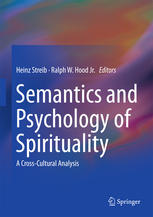

Most ebook files are in PDF format, so you can easily read them using various software such as Foxit Reader or directly on the Google Chrome browser.
Some ebook files are released by publishers in other formats such as .awz, .mobi, .epub, .fb2, etc. You may need to install specific software to read these formats on mobile/PC, such as Calibre.
Please read the tutorial at this link: https://ebookbell.com/faq
We offer FREE conversion to the popular formats you request; however, this may take some time. Therefore, right after payment, please email us, and we will try to provide the service as quickly as possible.
For some exceptional file formats or broken links (if any), please refrain from opening any disputes. Instead, email us first, and we will try to assist within a maximum of 6 hours.
EbookBell Team

4.1
70 reviewsThis book examines what people mean when they say they are “spiritual”. It looks at the semantics of “spirituality”, the visibility of reasons for “spiritual” preference in biographies, in psychological dispositions, in cultural differences between Germany and the US, and in gender differences. It also examines the kind of biographical consequences that are associated with “spirituality”. The book reports the results of an online-questionnaire filled out by 773 respondents in Germany and 1113 in the US, personal interviews with a selected group of more than 100 persons, and an experiment. Based on the data collected, it reports results that are relevant for a number of scientific and practical disciplines. It makes a contribution to the semantics of everyday religious language and to the cross-cultural study of religion and to many related fields as well, because “spirituality” is evaluated in relation to personality, mysticism, well-being, religious styles, generativity, attachment, biography and atheism. The book draws attention to the – new and ever changing – ways in which people give names to their ultimate concern and symbolize their experiences of transcendence.